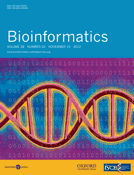
PROTEOMICS
metrics 2024
Transforming theoretical insights into practical applications.
Introduction
PROTEOMICS is a leading journal focused on the rapidly evolving field of proteomics, published by WILEY in Germany. With a solid reputation established since its inception in 2001, it has continually contributed to the understanding of protein functions and interactions within biological systems. As part of its commitment to academic excellence, PROTEOMICS is ranked in the second quartile for both Biochemistry and Molecular Biology categories (2023), reflecting its significant influence in advancing research in these areas. Although it does not currently provide open access options, it remains a vital resource for researchers, professionals, and students keen to explore innovative methodologies and findings in proteomic research. By publishing groundbreaking studies that bridge theoretical knowledge with practical applications, PROTEOMICS plays a crucial role in enhancing our understanding of molecular processes and driving forward advancements in the life sciences.
Metrics 2024
 1.01
1.01 3.40
3.40 3.90
3.90 182
182Metrics History
Rank 2024
Scopus
IF (Web Of Science)
JCI (Web Of Science)
Quartile History
Similar Journals

PROTEINS-STRUCTURE FUNCTION AND BIOINFORMATICS
Transforming Data into Discoveries in Structural BiologyPROTEINS - STRUCTURE FUNCTION AND BIOINFORMATICS, published by WILEY, is a leading journal in the fields of biochemistry, molecular biology, and structural biology, recognized for its significant contribution to protein research since its inception in 1986. With its impressive rankings in the Q1 category for Biochemistry and Q2 for both Molecular Biology and Structural Biology in 2023, the journal serves as an essential resource for researchers and professionals seeking to explore the intricate relationships between protein structures and their functions. The journal, based in the United States, operates without an Open Access model, ensuring a curated selection of high-quality peer-reviewed articles that drive innovation and collaboration in the scientific community. Engaging with the robust content of PROTEINS not only bolsters academic scholarship but also opens avenues for groundbreaking discoveries that are pivotal in the advancing field of bioinformatics.

COMPUTATIONAL BIOLOGY AND CHEMISTRY
Pioneering Solutions for Tomorrow’s Biological Challenges with Computational TechniquesCOMPUTATIONAL BIOLOGY AND CHEMISTRY is a distinguished academic journal published by Elsevier Science Ltd, focusing on the dynamic intersection of computational biology, biochemistry, and chemistry. With an ISSN of 1476-9271 and an E-ISSN of 1476-928X, this journal is committed to disseminating high-quality research that employs computational techniques to solve complex biological and chemical problems. As of 2023, the journal holds a substantial impact factor reflecting its significance and rigorous peer-review process, categorized in the Q2 quartile for both Computational Mathematics and Organic Chemistry, alongside Q3 classifications in Biochemistry and Structural Biology. With a continuous publication history spanning from 2003 to 2024, it serves as a critical resource for researchers, professionals, and students alike. The journal offers various open access options, ensuring that vital research findings are accessible to a global audience, further enhancing collaboration across disciplines. Engage with cutting-edge studies and contribute to the evolving landscape of computational methodologies in the life sciences through this esteemed publication.

Comparative Biochemistry and Physiology D-Genomics & Proteomics
Innovating Biological Discoveries with High-Impact ResearchComparative Biochemistry and Physiology D-Genomics & Proteomics, published by Elsevier Science Inc, is a premier journal in the realm of molecular biology and comparative physiology, with a focus on genomic and proteomic sciences. Recognized for its high-impact contributions, it holds a Q1 ranking in Animal Science and Zoology and was established with the vision of bridging gaps in our understanding of biological systems through experimental and comparative approaches. With an impressive Scopus ranking, this journal not only ranks among the top 12% in Animal Science and Zoology but also demonstrates commendable standings across various categories including Aquatic Science and Molecular Biology. The journal’s commitment to disseminating high-quality research makes it an essential resource for researchers, professionals, and students alike, allowing them to access critical studies that influence advancements in genomics and proteomics. While it operates under a traditional subscription model, its impactful findings are crucial for those aiming to enrich their knowledge and research capabilities in these pivotal scientific fields. Join us in exploring the transformative insights and developments that this esteemed journal has to offer for the study of genomics and proteomics.

BIOCHIMICA ET BIOPHYSICA ACTA-PROTEINS AND PROTEOMICS
Unveiling the Secrets of Proteins and Their InteractionsBIOCHIMICA ET BIOPHYSICA ACTA-PROTEINS AND PROTEOMICS, published by Elsevier, is a prestigious academic journal that serves as a vital resource for researchers, professionals, and students in the fields of biochemistry, biophysics, and proteomics. With an ISSN of 1570-9639 and an E-ISSN of 1878-1454, this journal features high-impact research articles aimed at advancing our understanding of protein structure, function, and interactions, contributing significantly to both theoretical and applied sciences. Recognized for its quality, it proudly holds a Q1 ranking in Analytical Chemistry and Biophysics, and Q2 in Biochemistry for 2023, alongside notable Scopus rankings that reflect its influence in the realm of molecular biology. The journal's commitment to disseminating essential findings supports the ongoing evolution of proteomic sciences and encourages collaborative discourse among the global scientific community. For aspiring authors, the journal offers open access options, enabling broad visibility of their work. Join the conversation in this dynamic field and contribute to shaping the future of protein research!

ACS Chemical Biology
Fostering Interdisciplinary Insights in Chemical BiologyACS Chemical Biology is a premier journal published by the American Chemical Society, dedicated to advancing the understanding of the chemical underpinnings of biological systems. With an ISSN of 1554-8929 and a distinguished track record since its inception in 2006, this journal provides a vital platform for the dissemination of high-quality research in the realms of biochemistry and molecular medicine, achieving a prestigious Q1 ranking in these categories as of 2023. In an era where interdisciplinary approaches are crucial, ACS Chemical Biology fosters collaboration among chemists and biologists, reflecting a steadfast commitment to exploring the chemical processes that govern life. Although it does not operate under an open-access model, the journal maintains a rigorous peer-review process, ensuring the publication of influential studies that shape the future of chemical biology. With an increasing impact factor and a focus on innovative research, ACS Chemical Biology remains an authoritative resource for researchers, professionals, and students eager to engage with cutting-edge findings in this dynamic field.

Clinical Proteomics
Exploring the Frontiers of Proteomics in MedicineClinical Proteomics is a leading open-access journal, published by BMC since 2011, that aims to advance the field of proteomics by providing a platform for the dissemination of original research, critical reviews, and technological advancements in the analysis of proteins and their roles in health and disease. With an ISSN of 1542-6416 and E-ISSN 1559-0275, this esteemed journal covers a broad scope, converging years of research from 2004 to 2024. As a distinguished publication, it holds a Q1 ranking in Clinical Biochemistry and Q2 in both Molecular Biology and Molecular Medicine, reflecting its significance in the scientific community. Clinical Proteomics' commitment to open access ensures that its content is readily available to researchers, professionals, and students worldwide, facilitating the exchange of knowledge and fostering collaborative efforts in proteomic studies. Situated in the United Kingdom, this journal plays a pivotal role in shaping the future of biomedical research, appealing to anyone keen on the integration of proteomics in clinical practice and molecular investigation.

Current Bioinformatics
Advancing the Frontiers of Bioinformatics ResearchCurrent Bioinformatics, an esteemed journal published by Bentham Science Publishers Ltd, serves as a pivotal platform for the dissemination of cutting-edge research in the fields of bioinformatics, biochemistry, computational mathematics, genetics, and molecular biology. With an ISSN of 1574-8936 and an E-ISSN of 2212-392X, this journal has established itself as a vital resource for researchers, professionals, and students keen on exploring interdisciplinary approaches to biological data analysis. Its prominence is reflected in its quartile rankings for 2023, where it stands in Q3 for biochemistry and computational mathematics, alongside Q4 rankings in genetics and molecular biology. Current Bioinformatics, located in the United Arab Emirates and converging from 2007 to 2024, aims to foster innovation in the field by presenting original research articles, reviews, and case studies that drive forward our understanding of complex biological systems through computational techniques. This journal is an integral resource for those wishing to stay at the forefront of bioinformatics research and applications.

AMYLOID-JOURNAL OF PROTEIN FOLDING DISORDERS
Elevating Knowledge in Protein Folding DisordersAMYLOID - JOURNAL OF PROTEIN FOLDING DISORDERS, published by Taylor & Francis Ltd, is a premier academic journal dedicated to the crucial field of protein folding disorders, offering a vital platform for researchers and healthcare professionals. With an impressive impact factor and classified in the Q1 quartile across both Internal Medicine and Miscellaneous Medicine categories, this journal ranks within the top 15% of its field according to Scopus, with a remarkable rank of #18 out of 167. Covering interdisciplinary approaches that intersect molecular biology, neuroscience, and clinical implications of amyloidosis and related disorders, AMYLOID encourages the dissemination of innovative research findings from 1994 to 2024 and beyond. Despite lacking Open Access options, the journal remains a significant resource for advancing the understanding of protein misfolding diseases, influencing clinical practice and therapeutic developments. With its longstanding commitment to high-quality research, AMYLOID continues to be an essential reading for scholars, practitioners, and students who aim to make significant contributions to this evolving field.

Biomarker Insights
Advancing biomarker research for a healthier tomorrow.Biomarker Insights, published by SAGE Publications Ltd, is a leading open-access journal dedicated to advancing the field of biomarker research and its applications in health and disease. With an ISSN of 1177-2719 and an E-ISSN of 1177-2719, this journal has been at the forefront of disseminating high-quality scientific findings since its inception in 2006. Based in New Zealand, it has achieved a notable impact within the academic community, ranking in Q2 for Biochemistry (medical) and Molecular Medicine, and Q1 in Pharmacology as of 2023. This positions Biomarker Insights as a critical resource for researchers, professionals, and students alike, looking to explore innovative methodologies and applications in biomarker discovery and validation. With a commitment to open access, the journal ensures that groundbreaking research is readily available to the global community, fostering collaboration and innovation in the ever-evolving field of biomedical sciences.

BIOINFORMATICS
Exploring the Synergy of Data and Life SciencesBIOINFORMATICS, published by Oxford University Press, is a leading journal in the realms of biochemistry, computational mathematics, and computer science, with a notable impact factor that underscores its significance in the field. Since its inception in 1985 and continuing through its expected convergence in 2024, the journal has maintained a prestigious reputation, proudly residing in the Q1 category across multiple disciplines, including molecular biology and statistics. With a Scopus ranking placing it within the top percentiles of its categories, BIOINFORMATICS serves as an essential platform for disseminating high-quality research that advances knowledge and innovation at the intersection of biology and computational sciences. This journal not only offers both subscription and open access options, ensuring wider availability of its cutting-edge research, but it has also become a crucial resource for researchers, professionals, and students aiming to stay at the forefront of bioinformatics and related fields. Explore the latest findings and trends that define the future of biological research through this esteemed publication, any inquiries regarding the journal can be directed to its offices located at Great Clarendon St, Oxford OX2 6DP, England.